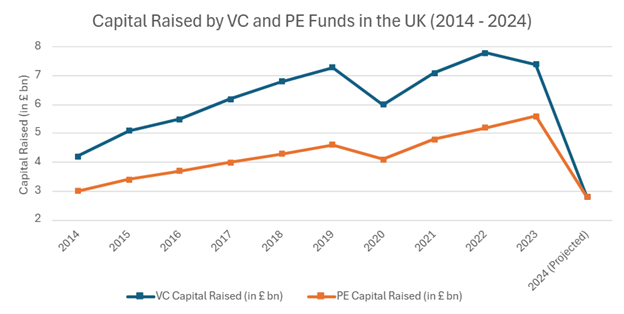The UK’s venture capital (VC) landscape is experiencing a notable decline in capital raised, with figures for the first quarter of 2024 revealing a significant drop from the previous year. According to PitchBook, UK VC funds secured only £700 million across 10 vehicles between January and March, projecting an annual total of £2.8 billion, a sharp contrast to the £7.4 billion raised in 2023. This decrease highlights the absence of large fund closures, as smaller, emerging firms have taken a larger share of limited partner (LP) capital.
To illustrate this trend, here is a chart showing the capital raised by VC and PE funds in the UK from 2014 to the projected values for 2024:

Despite this downturn, Dealroom’s report from January suggests that VC funds raised $25 billion over the last three years, indicating that there is still considerable capital to be deployed in the market. However, the first quarter’s decline in fundraising has added pressure on deal-making activities. The £2.3 billion VC investments made into companies during this period represent a decrease both quarter-over-quarter and year-over-year, reflecting a weak start to the year.
This challenging environment is compounded by a difficult macroeconomic backdrop. The Bank of England’s slower pace in cutting interest rates compared to its European counterparts has contributed to the cautious investment climate. Nonetheless, the private equity sector in the UK shows a contrasting trend, with capital raised in the first quarter already reaching half of the total amount secured throughout 2023. Notable private equity fund closures by firms such as Permira and Apax underscore this resilience.
Geographically, London continues to dominate the UK’s VC landscape, attracting £87.7 billion in investments between 2014 and 2024. Outside the capital, Cambridge stands out with the highest VC deal value at £6.8 billion, followed by Oxford at £4.4 billion. Interestingly, the 10-year median VC valuations for Oxford and Cambridge have surpassed those of London, although a significant gap remains between these cities.
The current situation presents both challenges and opportunities. The reduced availability of capital could lead to more selective and strategic investments, potentially fostering innovation and efficiency among startups seeking funding. Investors may also explore emerging sectors and regions within the UK, diversifying their portfolios and mitigating risks associated with traditional investment hubs.
The UK’s VC market remains a crucial component of the broader financial ecosystem, driving innovation and economic growth. As the year progresses, the ability of VC funds to adapt to the evolving economic conditions and investor sentiments will be pivotal. The current trends suggest a need for strategic agility, robust market analysis, and a focus on emerging opportunities to navigate this period of reduced capital availability effectively.
Practical advice for navigating this environment includes:
- Startups should enhance their value proposition: Focus on clear, compelling business models and unique solutions that stand out in a competitive market. Demonstrating strong potential for revenue growth and scalability will attract cautious investors.
- Investors should diversify portfolios: Explore investments in emerging sectors and regions outside traditional hubs like London. This strategy can spread risk and uncover high-growth opportunities.
- Maintain robust financial management: Both startups and investors should practice diligent financial planning and management to weather economic uncertainties. Keeping a close eye on cash flow, operating costs, and profitability is crucial.
- Leverage government and institutional support: Utilise available grants, incentives, and support from government programs and academic institutions, especially for sectors like technology and green energy, which are currently receiving increased focus and funding.
By staying adaptable and strategic, both startups and investors can continue to thrive in the UK’s evolving venture capital landscape.
(Sources: The home of UKTN)